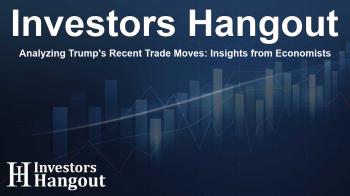Analyzing Trump's Recent Trade Moves: Insights from Economists

The Evolving Landscape of Trade Threats
Recently, former U.S. President Donald Trump has captured attention with his intense trade rhetoric, particularly concerning China. The renowned economist Nouriel Roubini has pointed out that Trump's cycle of making threats and then retracting them is becoming increasingly rapid, yet the financial markets seem to respond dramatically each time.
Trump's Bold Trade Statements
In a series of statements, Trump expressed a willingness to impose hefty tariffs on Chinese goods, which he claimed could reach as high as 100%. Following the backlash, Trump shifted his stance, reassuring that efforts were aimed at fostering cooperation between the countries. This duality, as noted by Roubini, reflects a trend in which Trump's aggressive trade posturing is met with quick reversals, leaving investors in a state of uncertainty.
Understanding Market Reactions
Roubini elaborated on the concept of 'market discipline', indicating that Trump's reactions to market fluctuations drive his decisions. When investors react negatively to Trump's threats, he often retracts those threats to mitigate any potential economic repercussions. Despite the quick turnaround from threat to retreat, he emphasizes that the markets often overreact to these statements as if they represent long-term policy changes.
The Impact of Rapid Fire Statements
The rapid succession from threats to reassurances demonstrates a pattern that continues to shape market behavior. Trump's initial aggressive remarks on tariffs led to a swift decline in stock values. Yet, as soon as he recapitulated his willingness to engage with President Xi Jinping of China, market sentiment shifted positively, showcasing the volatility that Trump's statements can trigger.
Investors and the Psychology of Trading
The psychological aspect of trading cannot be overlooked. Even with a clear understanding of Trump's patterns, investors often find themselves reacting to his statements enthusiastically, as if they were cemented strategies rather than mere reactions. Roubini warns that this ongoing cycle could lead to increasing market instability as the timing of Trump's threats and subsequent retreats shorten over time.
Analyzing Historical Trends in Trade Policies
Historically, Trump's interactions with international trade have fueled significant market movements. Regardless of the actual implications of his statements, short-term reactions often dominate financial markets, creating justifiable panic or exuberance among investors. Roubini argues that learning to gauge these moments effectively is essential for those engaged in market strategies.
Looking Forward: Potential for Future Developments
With the current trends indicating a faster turnaround in Trump's threat-retreat cycle, Roubini suggests that the only constant might be the unpredictability of these announcements. Investors and analysts need to recalibrate their approach toward interpreting Trump's statements, given that they tend to diminish in seriousness over time.
Frequently Asked Questions
What is the main concern raised by Nouriel Roubini regarding Trump's statements?
Roubini highlights that Trump's rapid threat and retreat cycle can lead to overreactions in the market, causing unnecessary volatility.
How do Trump's trade threats affect market stability?
Trump's aggressive trade policies often trigger immediate market responses, leading to swings in stock prices as investors react to his statements.
What does 'market discipline' refer to in this context?
'Market discipline' refers to the phenomenon where Trump retracts statements to avoid economic fallout, despite investors initially reacting to his threats.
How have Trump's tariffs impacted investor behavior?
Investors often react strongly to Trump's tariff threats, leading to increased buying or selling pressures in anticipation of potential changes.
What should investors consider moving forward?
Investors must remain vigilant and adaptable, recognizing that the speed of Trump's statements may reduce their weight, yet still drive significant market reactions.
About The Author
Contact Dylan Bailey privately here. Or send an email with ATTN: Dylan Bailey as the subject to contact@investorshangout.com.
About Investors Hangout
Investors Hangout is a leading online stock forum for financial discussion and learning, offering a wide range of free tools and resources. It draws in traders of all levels, who exchange market knowledge, investigate trading tactics, and keep an eye on industry developments in real time. Featuring financial articles, stock message boards, quotes, charts, company profiles, and live news updates. Through cooperative learning and a wealth of informational resources, it helps users from novices creating their first portfolios to experts honing their techniques. Join Investors Hangout today: https://investorshangout.com/
The content of this article is based on factual, publicly available information and does not represent legal, financial, or investment advice. Investors Hangout does not offer financial advice, and the author is not a licensed financial advisor. Consult a qualified advisor before making any financial or investment decisions based on this article. This article should not be considered advice to purchase, sell, or hold any securities or other investments. If any of the material provided here is inaccurate, please contact us for corrections.

